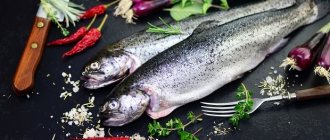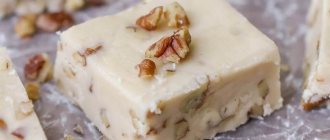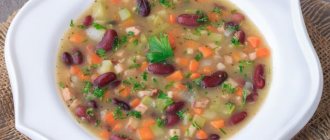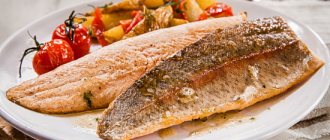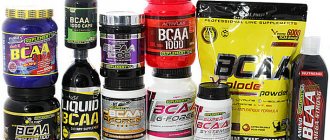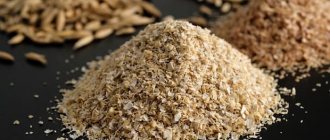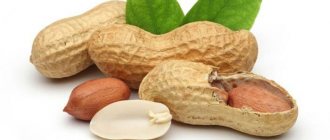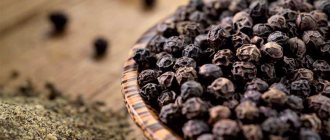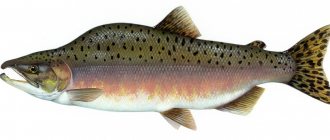Nutritionists have recognized that traditional Japanese cuisine is one of the most beneficial for human health. Chuka salad, which came to us from Japan, is currently gaining great popularity. Fans of the delicacy claim that this product is not only tasty, but also very healthy. What is this dish made from? What are its properties? Can it be harmful if used regularly?
Chemical composition and calorie content
The basis of the plant is made up of useful minerals. The most significant are sodium, zinc, iodine, selenium, fluorine, manganese, and iron. Also worth mentioning are copper, magnesium, calcium, aluminum, cobalt, manganese, potassium and phosphorus.
As for other valuable substances, chuka contains a lot of fiber, natural collagen, molybdenum, thiamine, Omega-3 fatty acids, vegetable proteins, amino acids, and choline.
Without overpowered elements, a person will not be able to fully exist, so the body will decline.
Due to its low calorie content, the product is included in the diet of people watching their figure. Nutritional value 100 gr. algae contains only 17 grams. carbohydrates, 7 gr. proteins, 1 gr. fat At the same time, calorie content varies between 60-62 Kcal.
benefits and harms of boiled beets
How to make a salad?
There are many recipes for seaweed salads. Below are the most popular ones.
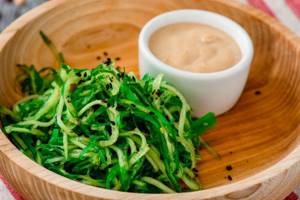
Salad “Traditional”
Prepared from frozen product. To prepare the dish, you must first defrost 250 g of seaweed. You will also need:
- pickled Japanese mushrooms – 100 g,
- 50 ml soy sauce,
- 50 ml water,
- teaspoon lemon juice,
- 1/3 tbsp. spoons of starch,
- chili pepper to taste,
- 1.5 tbsp. spoons of sesame seeds,
- a teaspoon of sesame oil.
Preparation: mushrooms and chili peppers need to be thinly sliced, sesame seeds should be fried a little. All ingredients are placed in a deep bowl and mixed. If you prepare a salad from a dry product, you must first soak it in water for several hours. After swelling and acquiring a natural color, the product can be placed in a salad.
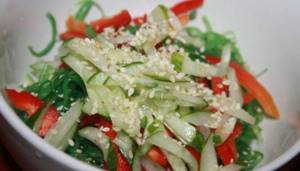
Vegetable salad"
For the dish you need:
- 100 grams of thawed or soaked seaweed in water (it must be taken into account that when the product swells, the product becomes heavier),
- 2 medium cucumbers,
- one small fresh carrot,
- bell pepper – 1 piece,
- 2 tbsp. spoons of soy sauce,
- sesame oil – 1 tbsp. spoon,
- olive oil – 1 tbsp. spoon,
- 10 ml apple cider vinegar,
- 1 tbsp. spoon of honey
- chopped ginger - 5 g,
- lemon zest and juice - 1 teaspoon each,
- sesame – 5 g.
Preparation: vegetables need to be grated. Sesame seeds are fried in a dry frying pan. Next, a dressing is prepared from oils, honey, vinegar, sauce, ginger, lemon, lemon juice and sesame seeds. Vegetables are mixed with seaweed and poured over with dressing.
Chuka algae - human healer
If you include chuka in your daily diet, you will provide the body with the necessary beneficial enzymes. Algae bring particular value to tooth enamel, strengthening it and protecting it from caries.
It is useful to eat chuka to cope with:
- diarrhea;
- constipation;
- anemia;
- neurosis;
- psoriasis;
- depressed state, stress;
- digestive ailments;
- difficulties in the functioning of the thyroid gland;
- chronic diseases of many types;
- slow blood circulation.
Benefits of Chuka seaweed
- Regular and dosed use of the product improves the functioning of the heart. Chuka thickens vascular walls, expands blood nodes and accelerates microcirculation. Thanks to this, excellent prevention of heart attacks and strokes is carried out. It is useful for smokers to eat chuka to prevent blockage of blood vessels.
- Algae remove bad cholesterol from the blood and stop the formation of plaques. This quality of chuka is valuable for people suffering from diabetes and atherosclerosis.
- The product is of particular benefit to the digestive system. Chuka absorbs poisons and toxins found on the intestinal walls. Thanks to this, the internal organ is cleansed gently, without losing valuable enzymes.
- Algae remove excess bile from the pancreas and envelop the stomach and intestines with a protective film. In the future, you will protect yourself from exacerbation of gastritis and ulcers.
- Chuka is rich in iodine; high content of the element has a beneficial effect on the endocrine system. It is especially useful to include algae in the diet for people who live in cold regions and do not have the opportunity to bask in the sun for a long time. Chuka contains a lot of vitamin D, which will compensate for the deficiency.
- The marine composition gently cleanses the blood and promotes the formation of new cells. If you eat a little bit of chuka every day, you will rid the liver of radicals and prevent the appearance of cancer cells. Simply put, algae has amazing excretory properties.
- Chuka will be useful for people leading an active lifestyle and athletes. Algae is rich in protein and protein accumulation, which will benefit muscle tissue. You will gain weight and also prevent your body from deflating after a long break from training.
- Antioxidants rejuvenate tissues and have a beneficial effect on the skin (smoothes wrinkles, tightens the epidermis, fights stretch marks). Chuka also strengthens hair follicles, accelerating hair growth and preventing alopecia.
- Chuka is recommended for those who work a lot mentally. Seaweed activates brain activity, improves visual and auditory perception, allows you to concentrate much faster, increases the memorization of information and its subsequent structuring.
- Chuka actively fights the consequences of stress, eliminates chronic fatigue, and normalizes sleep. Seaweed removes excess salts and fluid from the body, preventing swelling of the limbs.
benefits and harms of kombucha for the body
Benefits of algae
Chuka helps maintain overall health and cope with certain diseases and symptoms:
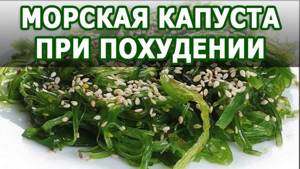
The functioning of the pancreas is stabilized and bile is secreted more actively.- Excess cholesterol is removed, which alleviates the condition of atherosclerosis.
- Excess weight goes away.
- The functioning of the kidneys and liver improves.
- The functioning of the digestive organs is normalized.
- The walls of blood vessels are strengthened, heart function is normalized and the likelihood of developing myocardial infarction is reduced.
- Hiashi has a positive effect on the thyroid gland due to the high iodine content in the plant.
- Increases brain activity and ability to concentrate.
- Chuka helps remove waste and toxins from the body.
- Chronic fatigue is relieved.
- The sexual desire of partners is stimulated and the synthesis of sex hormones is normalized.
- The product promotes rejuvenation of the face and body.
- Eating algae cleanses the blood.
- Regular consumption of wakame helps eliminate dental problems and strengthen gums.
- Algae are a source of vegetable protein for athletes.
- Wakame dishes are suitable for the treatment of senile dementia.
- The functioning of the prostate gland in men is normalized.
- Blood circulation in the pelvic organs in women improves.
- Stimulates the healing of mucous membranes after injuries or operations.
Benefits of Chuka seaweed for men and women
- Algae should be included in the daily menu for the stronger half of humanity. Chuka has a preventive effect against prostate diseases, gives endurance and strength. Salad belongs to the category of powerful aphrodisiacs, as a result of which potency and attraction to the opposite sex increase.
- Chuka algae are responsible for blood circulation in the pelvic area, bringing the flow to the optimal level. Eating algae reduces pain during the menstrual cycle and fights PMS symptoms. Experts have proven the value of seafood products in preventing the formation of malignant and benign tumors.
The benefits of chuka seaweed for weight loss
- Due to its low calorie content, chuka is actively consumed by people trying to get rid of extra pounds. For 100 gr. algae accounts for about 60 Kcal, which is good news.
- Nutritionists advise including at least 50-60 grams. product per day to provoke fat burning. The value for weight loss lies in the fact that you will lose weight without losing elements valuable to the body. Chuka will make up for everything with interest.
- The low-calorie composition is often added to the diet of people suffering from diabetes. The main feature of algae is considered to be the natural reduction of cholesterol in the blood and the normalization of sugar.
benefits and harms of Jerusalem artichoke
Some popular recipes
Algae is very loved by many people. You can make many delicious salads from them .
Simple salad
It requires:
- 100 g soy sauce;
- 100 grams of water;
- 2 teaspoons starch;
- lemon juice;
- 2 teaspoons sesame oil.
The ingredients need to be mixed in a saucepan and put on fire. The mixture should thicken, but not reach a boil. Pour the prepared (thawed and scalded with boiling water) seaweed over the prepared sauce. You can decorate the top with sesame seeds.
With nut sauce
For this salad you will need the following ingredients:
- walnut and cashew;
- chuka;
- water;
- soy sauce;
- mirin;
- peanut butter;
- sesame seeds and oil;
- orange and lemon juice;
- mitsukan;
- Bell pepper.
To prepare the nut sauce, pour 4 tbsp into a saucepan. spoons of peanut butter and add the same amount of water. Put everything on the fire and heat, stirring constantly. Walnuts and sesame seeds must be chopped. The capsicum is finely crumbled. All sauce components, spices, orange and lemon juice are added to the pan. Stirring, bring the sauce to a boil, turn off the heat and cool the mixture.
Thaw the seaweed, place in a bowl and pour over the nut sauce. Leave the dish to steep for two hours, then mix thoroughly. Place the salad on a plate, garnish with a slice of lemon and serve chilled.
Harm of chuka algae
- If you are getting acquainted with the product for the first time, start using minimal quantities (20-40 g). If after 3-4 hours there are no adverse reactions in the form of allergies, feel free to include chuka in your daily menu.
- Chuka has the unpleasant property of absorbing various substances from the environment. This quality determines the cleansing properties. However, if algae grows in dirty water, they quickly absorb heavy impurities. In this case, you should not consume the product so as not to provoke toxic poisoning.
- Contraindications include children (up to 12 years), since chuka contains a lot of iodine. Your child’s hormonal levels are still poorly organized, so you can upset the balance.
- If you have difficulties with the functioning of the endocrine system, consult a doctor before consuming chuka. Again, due to the accumulation of iodine, the accelerated production of thyroid hormones begins.
- Chuka softens the cervix, so you should not eat seaweed in the third trimester of pregnancy. Otherwise, you may experience premature labor. As for the early stages of gestation, seaweed often causes heartburn when consumed.
Molybdenum, which is part of the composition, heals connective tissues, saturating them with oxygen. Cobalt normalizes blood circulation, increasing all metabolic processes in the body. Vitamins accelerate natural cell regeneration and rejuvenate the body.
benefits and harms of boiled corn
Contraindications for use
Possible allergies! Therefore, nutritionists recommend starting acquaintance with 1 tbsp. l., gradually increasing the portion to 100–150 g.
Brown algae contains alginic acid. It retains water and absorbs substances from the marine environment, including up to 90% of heavy metal salts and radionuclides (according to research by Russian, Norwegian and Japanese scientists). Therefore, raw materials from environmentally unfavorable places are hazardous to health.
At the moment, the waters of the Sea of Japan and Okhotsk are still considered clean.
Chuka salad can be harmful to health in the following cases:
- allergies or individual intolerance to recipe ingredients;
- dysfunction of the thyroid gland;
- stomach and duodenal ulcers, gastritis and enteritis in the acute stage.
Eating wasame can bring both benefits and harm to the body.
First on the list of risks is allergies: people with allergic reactions to iodine and seafood should not try this seaweed.
Due to the large amount of iodine, it is necessary to limit the consumption of salads with chuka for children under 12 years of age. This is explained by the fact that excess iodine in a child’s body can lead to hormonal imbalance. The same consequences will occur in people with thyroid dysfunction.
And, as we already wrote above, women in the third trimester of pregnancy should avoid eating wasame sea salad due to the risk of premature birth.
Serious harm to health is caused by low-quality food, products with expired shelf life, and spoiled goods. Avoid eating dried or frozen wasame if there is any doubt about its quality. We will tell you how to choose and properly store sea lettuce in the next section.
Anyone who has chosen this product for their menu must know not only about the benefits of the product, but also about possible contraindications to its use in the diet. Like many products, this ingredient requires caution when first introduced to it.
Some restrictions will help avoid unpleasant consequences. Seaweed should be included in small quantities or completely excluded from the menu under the following conditions:
- Individual intolerance (allergic reaction of the body).
- Improper storage of the product.
- Children's age up to 12 years.
- Disorder of thyroid function.
- Pregnant and lactating women.
From a nutritional point of view, chuka salad is an excellent addition that can diversify and enrich your daily diet. However, its high iodine content makes it not a completely safe product.
Chuka, like any product saturated with various elements, can bring not only benefits to the body, but also harm. Algae tend to absorb all the substances that are around, so those grown in an unfavorable place can lead to poisoning.
Contraindications include:
- Women in the third trimester of pregnancy. Chuka can cause uterine contractions and lead to premature birth.
- Children under 12 years old. High iodine intake can disrupt a child's hormonal levels.
- People suffering from thyroid diseases. If you are ill, you must constantly monitor the amount of iodine you consume.
- Stomach ulcer and gastritis in the acute stage.
- Allergy sufferers. Seaweed can cause an acute allergic reaction in people prone to allergies.
Video: chuka salad (hiashi wakame)
Seafood fits perfectly into a healthy human diet. They are nutritious, low in calories and have a beneficial effect on the body. Chuka salad is very popular, the benefits and harms of which are the order of the day today. Chuka lettuce belongs to the group of algae, like seaweed.
From the same category, the wild brown algae Wakame, which lives on underwater rocks, Kombu and Kaiso algae, are slightly less known. Chuka salad is prepared from these types of plants (“chuka” means “Chinese” in Japanese; it was from China that seaweed was brought to the country in large quantities).
The use of chuka salad in cooking
The main purpose of chuka is cooking. In order to prepare a dish from this product, you do not need to be a qualified chef. It is enough to have a quality product on hand and show a little culinary imagination.
The ingredient, rich in minerals and vitamins, is used in the preparation of soups and stews. It is used for making rolls, all kinds of salads and as a side dish. A small amount of edible algae will not only decorate the dish, but also make it unusual in taste.
The exotic chuka salad does not have a pronounced taste, so it cannot serve as an independent dish. It would be most suitable to use it for preparing a salad or for a complex side dish.
In Japanese traditional cuisine, chuka is prepared with national noodles, mushrooms, poultry, and nuts. In order to highlight the taste of seaweed and give the dish a more piquant taste, various spices and dressings are used.
The most commonly used foods are soy sauce, hot peppers, sesame seeds and sesame oil. Along with this, it is allowed to use vegetables familiar to Europeans: tomatoes, cucumbers, beans and seafood.
Alternatively, you can use chuka to prepare a warm salad in combination with grilled vegetables (zucchini, eggplant, bell peppers).
Chuka algae in Russian official medicine are sometimes used as one of the components of a diet to restore health after various diseases. Nutritionists recommend consuming seafood if you are overweight and to stay in shape.
In folk medicine, it is recommended to consume salads with chuka to prevent and treat the following diseases:
- seasonal vitamin deficiency;
- anemia;
- heart attack;
- cardiovascular pathologies;
- atherosclerosis;
- pancreatic diseases;
- gastrointestinal problems;
- dermatoses;
- disorders of the hematopoietic system;
- neurosis;
- inflammation of the gums;
- tumors;
- diabetes mellitus;
- impotence in men;
- congestion in the pelvis in women.
In culinary terms, chuka is used to prepare various dishes. Salads are prepared from it, added to soups and sushi. In oriental cooking, seaweed is combined with the following ingredients:
- soy sauce;
- sesame and its oil;
- nut sauces;
- seafood;
- spices;
- tree mushrooms;
- rice.
Europeans contributed to a variety of chuka seaweed dishes. The plant is combined with legumes, various vegetables, chicken, eggs, citrus fruits, and mushrooms. Salads with chuka seaweed are given a special taste by different sauces.
In Japan and China, dishes made from seaweed or seaweed are very popular. Cooks use seafood to prepare soups, salads, and sushi. Almost all countries of the world today eat salads with chuka and prepare sauces and side dishes based on it.
The main ingredients of dishes with wasame are traditional in oriental cuisine:
- rice, red pepper, spices;
In European cuisine, chuka is combined with vegetables, rice, beans, nuts, chicken or fish fillet. The taste of the seaweed differs from the kelp that many are accustomed to: it is more delicate and does not have a bright iodine note.
The most common recipe: a mixture of wasame seaweed with rice or legumes. This dish is served as an appetizer or side dish. To prepare it, just lightly boil the seaweed, mix it with boiled rice or beans, and season with sesame oil. Instead of salt, you can use soy sauce.
An interesting recipe for wakame salad with celery:
- wakame seaweed – 250g;
- vegetable oil – 20 g;
- sesame seeds, pepper, salt, sugar - to taste.
Boil the chuka seaweed in salted water and drain in a colander. Dissolve spices, flour and butter in the remaining broth (150 g). Stirring, bring the sauce to the desired consistency. Cut the celery into strips and place it in the hot sauce. After cooling, mix celery and boiled chuka seaweed, pour over lemon juice. Sprinkle with sesame seeds before serving.
For those who are watching their figure and getting rid of extra pounds, we recommend eating a low-calorie salad made from boiled wasame seaweed and brown rice. This dish is best seasoned with fresh lemon juice.
In China and Japan, seaweed has long been used to treat and prevent a number of diseases. For example, oriental healers prepare ointments and creams based on wasame to combat psoriasis and eczema. Eating this salad helps with anemia, heart disease, and gastrointestinal disorders. In addition, chuka strengthens and rejuvenates the body.
Chuka is of particular value for older people: the enzymes of the wonderful algae stimulate brain function and reduce the risk of developing Alzheimer's disease.
Composition and properties of the plant
For the Japanese, such a dish is a tradition; statistics say that each resident eats more than nine kilograms of algae per year. Chuka is found in many local dishes (noodles, rolls, sushi, or simply eaten as a salad). In Japan, you can try seaweed in almost every restaurant, and in our country you can buy it frozen or as a ready-made dish in sealed vacuum packaging.
The composition of chuka salad is rich in vitamins and minerals; the calorie content of seaweed is suitable for women who want to lose weight. Nutritional value of the product per 100 g:
- Proteins - 7 g;
- Fats - 1 g;
- Carbohydrates - 17 g;
Energy value per 100 g is approximately 60 kcal. This chemical composition and energy value of chuka lettuce allows it to be used to improve the health of the body.
Selection criteria and storage
The nutritional value of chuka seaweed directly depends on the area of its growth, collection, storage and transportation conditions. The salad is supplied to the retail chain in frozen or prepared form. It should be borne in mind that the best way to preserve the product is shock freezing, which retains all the vitamins, microelements and the appearance of the plant.
During shock freezing (at temperatures from minus 18 to 20° C), the algae does not change its bright green hue. The quality of freezing is also indicated by the presence of ice and snow inside the package, which should not be present at all or in minimal quantities. During transportation, accidental defrosting of the product and re-freezing it again is unacceptable, which can lead to the formation of snow flakes and ice inside the package. Eating such a salad can cause severe poisoning.
When choosing algae, you need to pay attention to the following parameters:
- Reputation and reliability of the manufacturer.
- Place of collection and shelf life.
- The color of the plant varies from dark emerald to bright light green without brown or black inclusions.
- The algae should not be frozen.
- It is better to choose a product in transparent packaging, where it is easier to assess its quality.
The shelf life of frozen seaweed is one year at a temperature of -18 ° C. After defrosting, they can be stored for no more than a month in the refrigerator. Re-freezing the product is not recommended.
Ready-made salads (preserves) can be stored for no more than 4 months at temperatures from -3° to 6°C.
Chuka harm and contraindications
While listing all the advantages of algae, one cannot fail to mention their possible adverse effects on humans. It is not recommended to consume salad for people with a high iodine content in the body and thyroid diseases (possible hormonal imbalance).
Also, seaweed should not be introduced into the diet of children under twelve years of age. It is believed that some substances contained in plants can inhibit metabolic processes and contribute to water stagnation.
If a person has individual intolerance, this is another contraindication to eating salad. If an allergic reaction occurs, you should remove the product from your menu.
It should also be recalled that algae play the role of a biofilter in the ecosystem. They purify and disinfect the water in which they grow from various contaminants. If the area where they were collected is unfavorable, the ecology is bad, and the water is stagnant, then perhaps such plants will contain a considerable amount of harmful elements, and there will be no benefit from them to the body.
If you are going to buy chuka salad, you should pay attention to the following points:
- The color of the algae should be natural and pleasant. Their color is usually golden green, or may be malachite;
- The taste of the salad is neutral (compared to seaweed), more juicy, there is no pronounced smell of iodine;
- The structure is delicate and soft. If the salad is hard, tasteless and colorless, then it is of poor quality;
- If there were large pieces of ice in the package, the algae were defrosted and then re-frozen.
To protect yourself from possible disappointments, buy chuka salad only from trusted, reputable places. Then you can get maximum benefit and taste from the product without harm to your health.
Chuka seaweed is a marine product equipped with iodine and other mineral components. Not many people are familiar with this exquisite and unusual delicacy, which is a shame, because it contains a whole range of useful components, with the help of which you can not only reliably strengthen the body, but also effectively and reliably get rid of a number of different serious diseases.
Chuka algae, or as it is commonly called in Japan - Wakame - is a wild marine plant. Mostly, algae grow on hanging rocks near the sea coasts of Japan, China and Russia. It is not difficult to obtain this marine product, because the plant does not fall below 100 m in the water.
The Japanese were the discoverers of the sophistication and benefits of chuka; they were the first to extract this product from the depths of the sea and actively began to include it in the daily diet. The product has become loved for its refined and mild taste. A big plus of the product is that it does not contain any calories. Currently, chuka is used very widely in Japan; the product is included in sushi, salads, or eaten as a side dish for meat dishes.
Chuka came to Russia from China, which is why the name of the product is translated as “brought from China.” Initially, the seaweed was dried and then sent for export. Later, they learned to freeze the healthy product, and it is in this form that it can currently be found in modern grocery stores. It should be noted that frozen chuka seaweed retains its usefulness, as does the fresh product.
Compound
The main benefit of the product lies in its composition. Chuka contains the following components in its chemical composition:
- Almost the entire set of fortified substances;
- Mineral components - iodine, zinc, calcium, selenium, iron, phosphorus, potassium, copper, manganese, magnesium, sodium;
- Thiamine;
- Choline;
- Amino acids;
- Vegetable proteins;
- Collagen;
- Cellulose;
- Omega-3 fatty acids.
Useful qualities
How is chuka useful? Thanks to their rich chemical content, algae are a valuable storehouse of medicinal and beneficial properties for the human body.
- Algae help improve the functioning of the cardiac system; the product effectively strengthens the walls of blood vessels, and is also an excellent preventive measure against heart attacks.
- The product helps eliminate “bad” cholesterol from the blood; this property is an important indicator in the fight against the manifestation of atherosclerosis.
- Chuka promotes reliable normalization of the digestive system; the product reliably and gently cleanses the intestines of various wastes, as well as toxins, helps the pancreas work better, as it serves as an active stabilizer for the process of bile excretion.
- Chuka seaweed has a low calorie content; seaweed salads have an energy value of 60 calories per 100 grams. fresh product. This property is especially valued by nutritionists, as well as people who actively monitor their own weight. Based on the seafood product, a huge number of effective diets have been developed for reliable weight loss; the benefits of consuming chuka are invaluable: it copes with excess weight and fills the body of a person losing weight with nutrients and all vital components.
- Since chuka salad has minimal calorie content, it is also used in the diet of people suffering from diabetes. It is important to point out another important property of the product for diabetics - algae can naturally lower blood sugar levels.
- Due to the rich content of iodine in algae, the product helps to normalize the condition of the pancreas. People living in the Northern regions and where there is rarely sunshine simply need to include chuka in their diet as a product enriched with vitamin D, as well as the mineral component - iodine.
- Algae have a restorative and restorative effect on the human body. Regular inclusion of this marine product in the diet helps to rejuvenate the body, cleanse the liver and kidneys of harmful compounds, and gently cleanse the blood.
- For all those people who are actively and intensely involved in sports, chuka is a must-have product in the diet, because algae is a complete source of protein and protein, and these components are important for building muscle mass.
- Algae have a rejuvenating effect due to the rich content and composition of antioxidants.
- The seafood product has a positive effect on brain function, it helps relieve mental fatigue, and also increases the feeling of concentration, which is very important with increased mental activity.
- The benefits of chuka for the female body have been proven: the product promotes rapid healing of various damage to the mucous membrane of the genital organs and normalizes blood circulation in the pelvis. Science has proven that chuka is a preventive product against the risk of cancer.
- For men, chuka also has only benefits: the product gives strength and endurance, and prevents the manifestation of prostate diseases. The benefit of chuka salad for men also lies in the fact that the product is a powerful aphrodisiac; its daily use helps to increase sexual desire, increase male strength, and stabilize potency.
Rules for choosing a seafood delicacy
The beneficial properties of chuka algae largely depend on the place of its germination. In addition, storage conditions and processing method also have a significant impact on the usefulness of the product. Chuka arrives in Russian grocery stores frozen. If the shock method was used during freezing, then all the beneficial qualities inherent in the fresh product are completely preserved. In the case of shock freezing, the algae remains bright green. The quality of the product is indicated by the complete absence of pieces of ice and snow flakes in the packaging. If the product is defrosted (which should not happen), then snow and ice deposits are visible in the packaging. It is important to note that such a product can become hazardous to health, so purchasing a package of chuka that contains ice is strictly prohibited.
It is recommended to choose a frozen product in transparent packaging, this way you can more accurately determine the quality of storage. Frozen chuka must be stored under the following conditions: the frozen product is stored for a year, thawed seaweed can be stored for up to and including 1 month.
You can also buy chuka salad in grocery stores; the beneficial properties of such a dish depend on the ingredients of the product. Ready-made chuka salad is very convenient for busy people, because it does not need to be prepared, but can be eaten immediately. Salads also have their own rules for recognizing the quality of the product: if the seaweed is harsh in taste, has an unpleasant taste and has lost the brightness of its color, then this definitely indicates that the preparation technology was violated during the production of the salad. Eating such a salad is dangerous to your health. High-quality algae have a bright light green or malachite hue, are soft in taste, and their smell contains rich marine aromas.
Contraindications
The benefits and harms of chuka algae are invaluable; this product helps get rid of various diseases and fully fills the body with useful and important components, but such an extraordinary product also has its contraindications.
- The product may cause allergies.
- When chuka is used in nutrition, the benefits for the body can only be accurately provided if the algae grew in ecologically clean areas. If chuka grows in polluted waters, it absorbs toxins, pesticides and other harmful substances, which subsequently enter the human body.
- Since the seafood product contains a large amount of iodine, it is not recommended for children under 12 years of age to eat it. An excess of iodine in a child’s body can cause hormonal imbalance.
- A similar situation with hormonal imbalances can occur in people with thyroid diseases. Before taking Chuka for this category of patients, it is necessary to consult an endocrinologist.
- During pregnancy, chuka is consumed with extreme caution. In the early stages of pregnancy, such a product can cause heartburn, and in the later stages it can cause premature contractions and the process of delivery.
Dishes made from algae have ceased to surprise and have taken a permanent place in the menu of healthy eating enthusiasts. These are sushi, rolls, soups with seafood and chuka salad, which is unusual for the Russian stomach.
Photo: Depositphotos.com. Author: angorius.
Imported from China
The favorite salad in the Land of the Rising Sun is made from brown algae -
wakame
, or wakame (genus
Undaria
).
Leaves are up to 2 meters long with a delicate, slightly sweet taste, reminiscent of spinach. Just like kelp leaves, they have a pleasant crunch. Bright green color increases appetite. The absence of a pronounced iodine odor is another advantage of chuka. After all, it does not cause rejection in some people, as happens with seaweed.
The increased demand for seaweed in Japan was initially met by imports from China. The Japanese called the seafood “chuuka” (imported from China), which gave the salad its name. Variations of its preparation, borrowed from the inhabitants of the Middle Kingdom, are united by the name “Chinese”.
The nutritional value
The salad owes its beneficial properties to the main ingredient - brown algae, which includes:
- vitamins;
- minerals;
- amino acids;
- cellulose;
- fatty acid.
The leaves contain fat-soluble vitamins A, E, K and representatives of group B in full. Moreover, B2, B3 and B5 cover the daily requirement by half, and B9 (folic acid) - by 90%. Ascorbic acid is present in small quantities (3%).
Essential amino acids: valine, threonine, tryptophan, leucine make up 10% of the daily value, and glycine, arginine and methionine - 3-1.5%.
Among the mineral components, sodium and manganese predominate - 67% per 100 g. Magnesium and copper account for 30% each, and iron 20%. Moderate amounts of selenium, phosphorus and zinc are present.
This is interesting
. Due to accumulative abilities
seaweed
recognized as the main source of natural iodine. But in terms of its content, the primacy of wakama is erroneous. According to American research, the amount of this trace element in chuka is so small that it is of no interest.
Among the fatty acids, polyunsaturated ones predominate: linoleic and timnodonic (eicosapentaenoic acid).
Calorie content
Low-calorie chuka salad gives positive results as part of weight loss programs.
You need to understand: the nutritionally attractive 45 kcal, 8 g of carbohydrates, 0.1 g of fat and 3 g of protein per serving are contained in the seaweed itself, and not in the salad. Additional ingredients of the finished dish increase the nutritional value and number of calories by 1.5–2 times.
Beneficial features
With a reverent attitude towards healthy food, characteristic of eastern countries, seaweed has become a traditional basis of nutrition in China, Korea and especially in Japan.
Centuries of culinary experience have confirmed the benefits of seafood for the body, as evidenced by the life expectancy of lovers of Asian-Pacific cuisine.
For heart
Green lettuce “curls” are a proven means of preventing heart attack, cardiac ischemia, atherosclerosis, and high blood pressure.
- Linoleic acid, manganese and vanadium reduce cholesterol levels.
- Vitamins E and C support the elasticity and strength of blood vessels.
- Potassium and magnesium are responsible for myocardial contraction and reduce the risk of arrhythmia.
- Amino acids strengthen the heart muscle and normalize blood pressure.
Antioxidants
A complex of antioxidants helps prevent the harmful effects of free radicals: vitamins C, A and E, omega-3, methionine.
Natural “bodyguards” resist the appearance of diabetes, oncology, atherosclerosis, rheumatoid arthritis; maintain youth and improve brain activity.
For the stomach
Fucoidan (soluble fiber) in chuka lettuce has an anti-inflammatory effect on the gastric mucosa: it prevents Helicobacter pylori bacteria from attaching to its walls, prevents the appearance of ulcers and relieves the painful symptoms of peptic ulcer disease.
Vitamins A and E provide a powerful regenerating effect, therefore they are necessary for the healing of ulcers.
Iron, zinc and selenium activate the production of digestive enzymes, and folic acid stimulates the renewal of mucosal cells.
For vegetarians
Chuka salad is of interest to vegetarians as a vitamin supplement with a complex of macro- and microelements, essential amino acids, as well as a source of valuable fatty acids that promote the absorption of calcium from plant foods.
Participates in strengthening the immune system, relieves physical fatigue and depression.
The delicate aroma and taste of the dish partly compensates for the lack of fish in the diet.
Blood sugar
Salad prevents the development of diabetes mellitus and alleviates the course of the disease.
- Insulin in combination with chromium exhibits increased activity towards glucose, which is quickly utilized, turning into glycogen.
- Manganese is responsible for the stable production of peptide hormone.
- Vitamins A and B2 protect the blood vessels of the organs of vision and lower extremities from the destructive effects of sugars.
For the brain
Two servings of salad per week are enough to significantly improve brain function.
Phenylalanine, fatty acids, vitamins C, E, group B in the company of zinc and magnesium:
- increase concentration;
- improve psychological background and memory;
- help cope with stress and fatigue;
- prevent cerebrovascular accidents.
Weight loss
Lose weight with pleasure thanks to the low calorie content of chukka without lacking in nutrients.
The salad helps speed up metabolism and cleanse the digestive tract due to fiber and fucoxanthin (a fat burner from the carotenoid group), identified in brown algae by Japanese scientists from Hokkaido.
For youth
Seaweed contains beauty vitamins A, E, C, B5, B9 and pilifucose sulfate. It prevents the breakdown of collagen under the influence of harmful radiation. The action of these nutrients is aimed at maintaining healthy skin, hair and nails and fighting free radicals.
The anti-aging effect is enhanced by: linoleic acid, copper and omega-3.
For athletes
- Chuka provides the athlete with a complex of amino acids: glycine, arginine, methionine. From this valuable trio, creatine is synthesized, which is necessary for building muscle mass and increasing endurance.
- Linoleic acid accelerates metabolism and eliminates fat deposits.
- Vitamin A restores the body after training.
- Vitamins E and C compensate for the effects of oxidative stress, and manganese promotes the renewal of bone and cartilage tissue.
Women
Since the key to a woman’s health is normal hormonal levels, salad is extremely healthy for her.
- The complex effect of vitamins E and C, manganese, zinc and copper heals the reproductive system, normalizes the menstrual cycle, prevents congestion and inflammation in the pelvis, and symptoms of early menopause.
- Folic acid is needed for the proper development of the fetus during pregnancy.
- Iron is necessary to prevent anemia in mother and child.
- Vitamin K prevents bleeding during childbirth.
Important! Wakame algae contains little calcium and iodine, so eating salad from it during pregnancy is allowed. In Japan, women do not refuse this healthy dish while waiting for the baby to arrive. Japanese women willingly eat chuka even after childbirth.
For men
Wakame salad preserves stamina, strength, sexual health of men, reduces the risk of prostate diseases and infertility.
- Manganese improves the health of the reproductive organs.
- Sodium improves neuromuscular conduction.
- Zinc stimulates the production of sex hormones and sperm.
Against the background of the healing effects of nutrients, men's sexual desire and potency increase.
Additional Ingredients
Auxiliary ingredients are added to the chuka salad, which is neutral in taste, for piquancy: sesame seeds, soy sauce, mushrooms, rice noodles, etc.
Other types of algae, fish and shrimp, ham, garlic, hot peppers, citrus fruits, “playing up” the taste, increase the nutritional value of the dish. They saturate the recipe with healthy fats and amino acids, expanding the vitamin and mineral profile.
Contraindications
Possible allergies! Therefore, nutritionists recommend starting acquaintance with 1 tbsp. l., gradually increasing the portion to 100–150 g.
Brown algae contains alginic acid. It retains water and absorbs substances from the marine environment, including up to 90% of heavy metal salts and radionuclides (according to research by Russian, Norwegian and Japanese scientists). Therefore, raw materials from environmentally unfavorable places are hazardous to health.
At the moment, the waters of the Sea of Japan and Okhotsk are still considered clean.
Chuka salad can be harmful to health in the following cases:
- allergies or individual intolerance to recipe ingredients;
- dysfunction of the thyroid gland;
- stomach and duodenal ulcers, gastritis and enteritis in the acute stage.
Selection issues
When choosing frozen seaweed for salad, pay attention to the following signs:
- packaging integrity;
- absence of snow and ice;
- rich green leaf color.
Dried seaweed is also suitable for making chukka. The leaves packaged in bags are distinguished by high-quality raw materials. They are sold in pharmacy chains or health food stores.
Soak freeze-dried wakame in water before cooking. Select the quantity based on the calculation that after 10 minutes the volume will increase 4 times.
Ready salad
Ready-made salad from the store is a product that can be eaten immediately. Its quality is determined by its rich green color and pleasant marine smell.
It can be stored in the refrigerator for up to 7 days, and after opening the vacuum packaging, the period of consumption is reduced to 3 days.
You can find fresh chuka in sushi bars. Along with rolls, it is sold as an independent dish.
Cooking secrets
Thaw the frozen product at room temperature, and soak the dry product for 10 minutes in a bowl of water. Drain, dry on a paper towel and cut into thin strips.
Marinate just before cooking. Traditionally, the Japanese use soy sauce for marinade, but fruit vinegar can also be used.
The taste of wakame is enriched with nut dressing, sesame seeds, lemon or lime juice.
Nut sauce is a smooth Asian classic consisting of cashews or peanuts, sesame seeds and oil, rice vinegar, mustard and sugar.
Chefs of Japanese restaurants recommend trying ready-made dressings with exquisite notes of mushrooms, stevia, apple,
garlic
, corn.
You need to cut the ingredients for chuka “in Chinese”: into thin strips or transparent plates, small cubes or elegant half rings.
To reveal the flavor, sesame seeds are fried in a frying pan with a thick bottom with constant stirring. A crackling sound and a golden hue that appears after about 3 minutes will indicate readiness.
Chuka or kelp?
The main advantage of chuka is the absence of strict restrictions on consumption associated with the high content of calcium and iodine. Additional bonus: delicate taste with a subtle aroma of the sea.
Laminaria (in Russia it is called seaweed) is famous for its large amount of iodine in a bioavailable form. The absorption of microelements by the body reaches a record 70%. This feature is important for correcting the nutrition of Russian residents living in iodine-deficient regions.
But kelp salads are contraindicated for pregnant and lactating women, children under 12 years of age and people with certain thyroid diseases.
Classic recipe
The easy-to-prepare salad is close to the “original” eaten in Japan and provides the basis for culinary experimentation. You can add glass noodles made from rice flour, thinly sliced vegetables (cucumbers, tomatoes, zucchini), and sauce.
Ingredients:
- 250 g frozen wakame;
- 100 g pickled kikurage mushrooms (Auricularia auriculata).
For refueling:
- 50 ml water;
- 2 tbsp. l. soy sauce;
- 1 tsp. lemon juice;
- 1 tsp. sesame oil;
- 1.5 tbsp. l. sesame seeds;
- 1/3 hot pepper pod.
Cooking method:
- Combine the prepared seaweed with finely chopped mushrooms and lightly fried sesame seeds.
- Season with lemon juice, soy sauce and sesame oil.
- For spiciness, add thin slices of chili pepper.
More exotic cooking options include: red fish, chicken and turkey, pine nuts and arugula. It is not forbidden to add not only wakame to chuka, but also other types of seaweed, such as seaweed.
Read also: about the benefits of nori seaweed.
Calorie content
The salad owes its beneficial properties to the main ingredient - brown algae, which includes:
- vitamins;
- minerals;
- amino acids;
- cellulose;
- fatty acid.
The leaves contain fat-soluble vitamins A, E, K and representatives of group B in full. Moreover, B2, B3 and B5 cover the daily requirement by half, and B9 (folic acid) - by 90%. Ascorbic acid is present in small quantities (3%).
Essential amino acids: valine, threonine, tryptophan, leucine make up 10% of the daily value, and glycine, arginine and methionine - 3-1.5%.
Among the mineral components, sodium and manganese predominate - 67% per 100 g. Magnesium and copper account for 30% each, and iron 20%. Moderate amounts of selenium, phosphorus and zinc are present.
Low-calorie chuka salad gives positive results as part of weight loss programs.
You need to understand: the nutritionally attractive 45 kcal, 8 g of carbohydrates, 0.1 g of fat and 3 g of protein per serving are contained in the seaweed itself, and not in the salad. Additional ingredients of the finished dish increase the nutritional value and number of calories by 1.5–2 times.
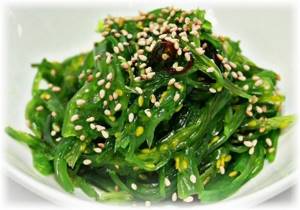
Algae consists of almost 80% water, and the remaining 20% contains all the unique qualities of the product. Chuka salad contains a whole complex of vitamins, microelements and other substances beneficial to humans:
- vitamins of groups A, B, C, D, E, K, PP;
- iodine; zinc; iron; calcium; potassium; magnesium; phosphorus; fluorine; manganese; sodium; cobalt; molybdenum; vanadium;
- proteins;
- amino acids;
- natural antioxidants;
- omega-3;
- cellulose;
- vegetable protein;
- choline;
- collagen.
Regular consumption of this seaweed can replace taking a vitamin complex!
The nutritional value per 100g of chuka salad is: proteins - 7 g; fats - 1 g; carbohydrates - 17 g; calorie content - 60 kcal.
Despite its low calorie content, chuka salad is very nutritious and allows you to feel full while receiving very few calories.
Sea grass contains many beneficial microelements. The product contains fiber, vegetable proteins, fatty acids, and collagen. It also includes the following elements:
- Minerals. The basis of the mineral composition is iodine. The algae also contains zinc, sodium, fluorine, selenium, manganese, copper, iron, calcium, magnesium, phosphorus, aluminum, potassium, and cobalt.
- Vitamins A, C, E, K, B, D, B, PP, B1, B4.
- Amino acids.
In addition to its rich chemical composition, salad is valued for being a low-calorie product. Calorie content per 100 grams - from 60 to 63 kcal. Depending on the subspecies of algae, the balance of BJU is: 68–70% carbohydrates (12–17 g), 23–28% proteins (4–7 g), 4–5% fats (about 1 g).
The product is quickly absorbed. It does not cause unwanted fat deposits, so it can be used by people who watch their figure and count calories. Chuka has a neutral taste, so it can be used as a main dish or as a component.
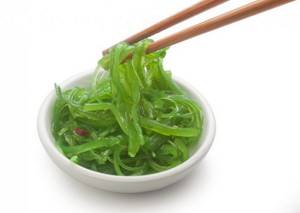
Nutritionists have recognized that traditional Japanese cuisine is one of the most beneficial for human health.
Chuka salad, which came to us from Japan, is currently gaining great popularity. Fans of the delicacy claim that this product is not only tasty, but also very healthy.
What is this dish made from? What are its properties? Can it be harmful if used regularly?
Exotic salad, endowed with a number of useful components, due to its low calorie content, is considered an ideal dietary product. It is especially popular not only among the Japanese. It is included in the diet of people leading a healthy lifestyle and those who dream of losing extra pounds through a diet.
Of course, the question of the benefits and possible harm of this product cannot but worry consumers. To be fair, it should be noted that exotic algae can be considered a natural pharmacy.
Its chemical composition allows it to have a beneficial effect on the human body. In particular, edible algae has the following effect:
- Saturates the body with vitamins and minerals.
- Strengthens the immune system.
- Raises tone.
- Strengthens the myocardium and prevents the development of cardiovascular diseases (arrhythmia, tachycardia, stroke, atherosclerosis, myocardial infarction, hypertension).
- Increases the elasticity of blood vessels and promotes good blood flow.
- Removes cholesterol from the body.
- Stimulates the functions of the gastrointestinal tract.
- Rids the body of toxins, waste and free isotopes.
- Liquefies bile and ensures its outflow, prevents the formation of stones in the gall bladder.
- Restores the functions of the pancreas.
- Helps get rid of excess body weight.
- Reduces the glycemic index.
- Ensures normal functioning of the thyroid gland.
- It has a rejuvenating effect on the skin in particular and the entire body as a whole.
- Improves blood quality.
- Eliminates inflammatory processes and the formation of kidney stones.
- Improves blood circulation in the brain, improves its activity.
- Increases the ability to overcome physical and mental stress.
- Improves hormonal levels, facilitates physical condition during menopause (in women).
- Reduces the risk of developing prostatitis (in men).
- Strengthens bone structure and tooth enamel.
The nutrients contained in the salad allow it to be used in the diet of weightlifters and bodybuilders to successfully build muscle mass. The product is also successfully used in diets aimed at weight loss.
Seaweed in folk medicine is used mainly as a preventive and tonic component. Cosmetologists use it for wraps for cellulite, and also as a raw material for nourishing masks and peeling.
